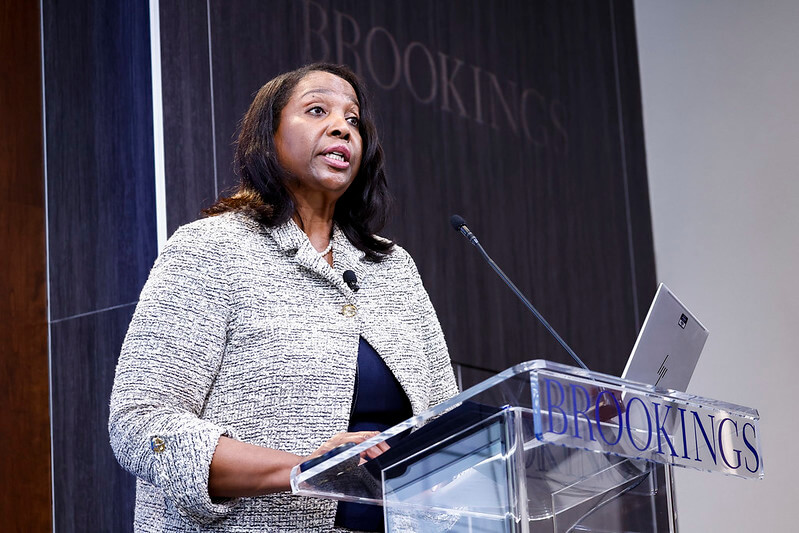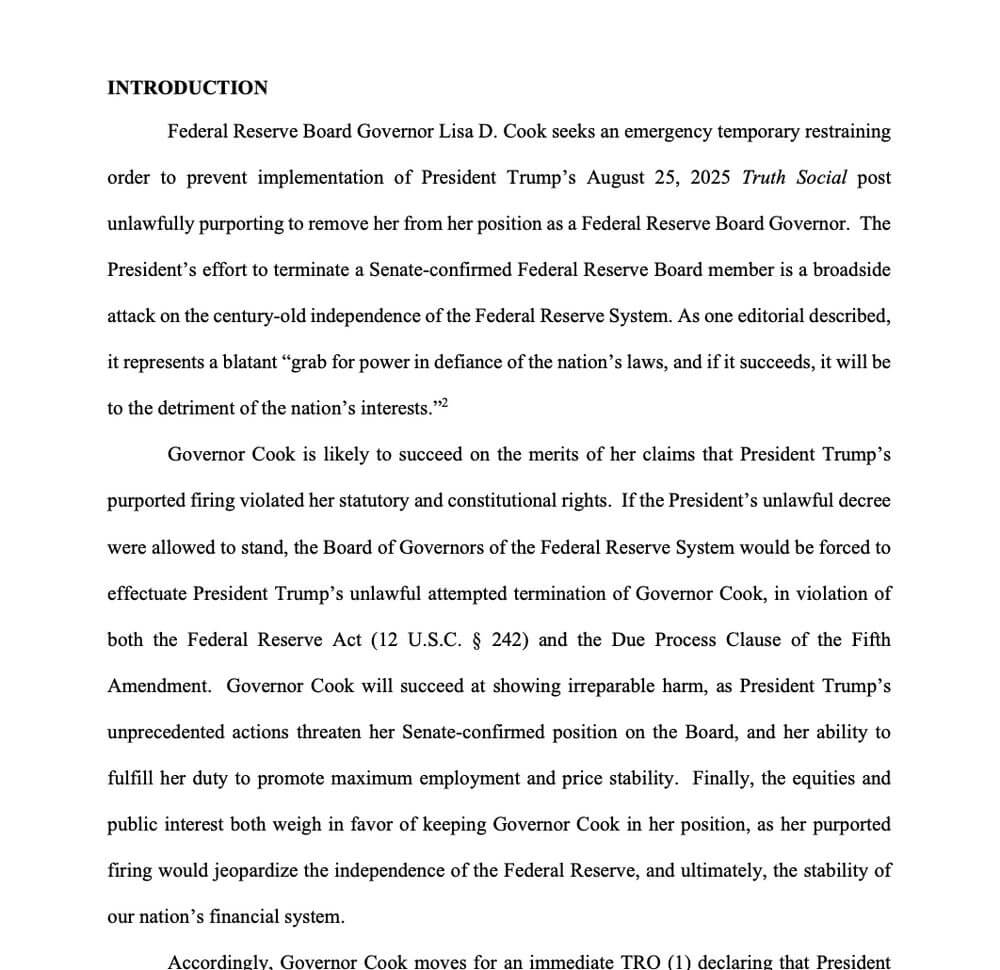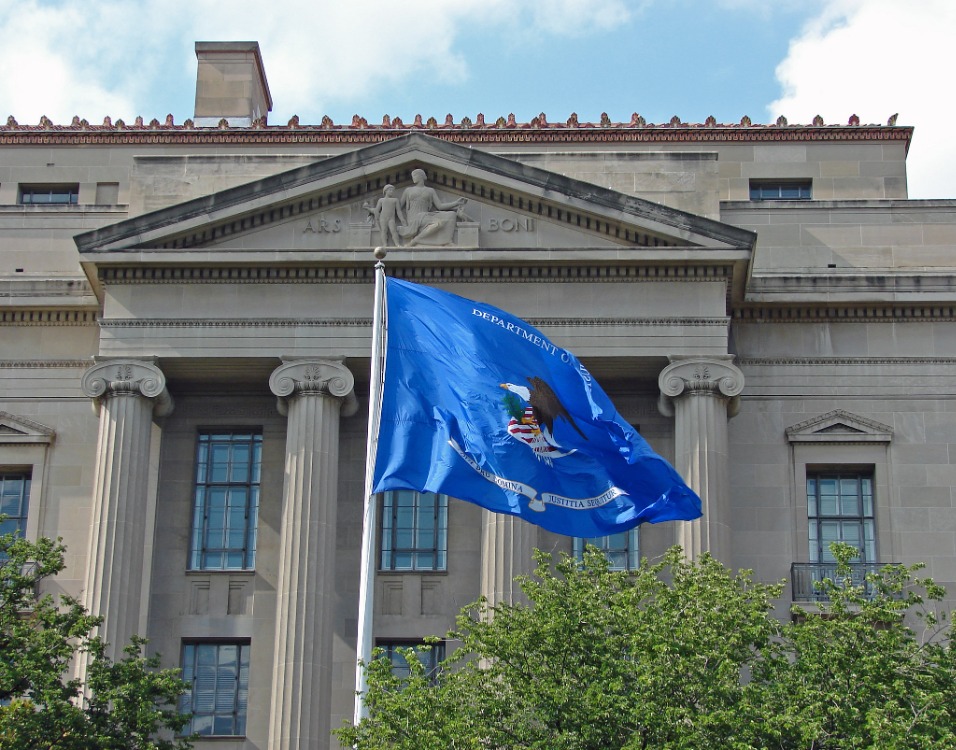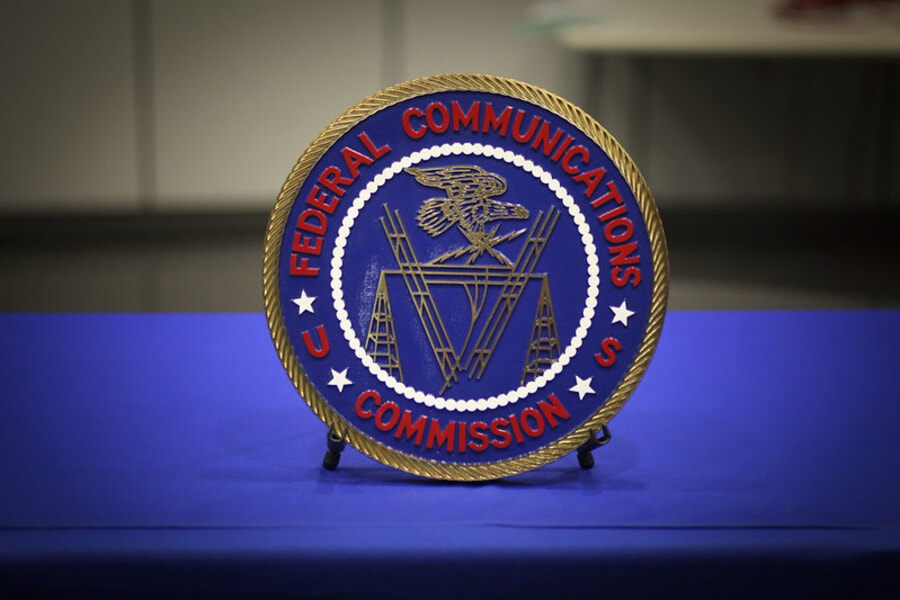What Happened During Fed Governor Cook’s Hearing?

On Friday, Aug, 29, Judge Jia Cobb held a hearing in Cook v. Trump, a lawsuit in which Federal Reserve Governor Lisa Cook is challenging President Donald Trump's attempt to fire her from the Board of Governors.
The two-hour hearing, held at the E. Barrett Prettyman courthouse in Washington, D.C., focused on Cook’s request for a temporary restraining order to block her removal from the board.
Judge Cobb concluded the hearing without issuing a ruling. The earliest a decision is expected is Tuesday, following further briefing from Cook’s legal team.
Lawfare’s Anna Bower covered the hearing as it happened. Read her report by clicking the button below or view her thread on Bluesky.
Liveblog
HAPPENING NOW: Hello from the media room in DC district court, where Judge Jia Cobb is set to hear argument on Lisa Cook's motion for a temporary restraining order to block her removal from the Board of Governors of the Federal Reserve.
I'm here for @lawfaremedia.org. Follow along ⬇️🧵

"All rise" as Judge Cobb enters the courtroom. Court officer calls the case. Parties introduce themselves: Abbe Lowell for Lisa Cook. Yaakov Roth here for DOJ. Josh Chadwick for Board of Governors.
Before we get started, Judge Cobb says, I want to know the plaintiff's plans for next steps. Does Cook plan to file motion for preliminary injunction? Lowell: Yes, that would be plan, and here would ask that court allow us to reply to government's response to this TRO motion, which was just filed
Lowell: The federal reserve board is waiting for the court's decision...They aren't taking action today and won't until the court rules. Cobb: This case raises issues that may be of first impression. I have questions today but want parties to be able to make arguments they need to make...
Lowell: Makes sense, but we came to you for a TRO bc when the president uses his social media to fire someone, the Fed has to know what to do...Now there's uncertainty, and we're here to preserve the status quo.
Cobb: I wasn't suggesting months-long briefing schedule...but there on preliminary injunction or summary judgement briefing issue, I'm curious how the court should deal with pretext issue. That doesn't seem like issue of law, it's issue of fact
Lowell: As you raised, we have phenomenon in this admin in which I don't know what discovery I might need on pretext, bc William Pulte is so vocal about what's going on...court might find sufficient to make inferences from that. So haven't figured out need for discovery on pretext part...
Cobb: So you will file reply to government's opposition....? Lowell: We could do it by end of day Cobb: Can you do it by Tuesday morning? Lowell: I know supposed to be Labor Day weekend, but we don't mind doing the labor
Lowell adds that he thinks this is a case in which it might be useful to have amicus parties contribute briefs on the matter.
Roth, for DOJ, says the government generally consents to amicus briefs.
Now Cobb wants to hear Lowell discuss the merits. Lowell begins by providing overview of the facts. Cook is a member of the board of governors of the Fed. Trump posted on social media that he was removing her, citing a release of a referral letter sent by FHFA director William Pulte.
Importantly, Lowell continues, Pulte says that it "appears" she did something wrong. Not that she did it -- but that it "appears" as such.
Cobb: Can we pause on the "cause" piece. You're arguing that I should interpret it in line with other statutes...But the government is saying that here the discretion is given to the president because in this statute it doesn't define cause. And they say that gives president discretion to decide.
Lowell responds to this: Either "cause" means nothing -- and the president, like Humpty Dumpty, gets to choose what words mean based on what he thinks it means. Or "cause" actually means something, as it does in other statutes...
Cobb: Is your position that any conduct that pre-dates the appointment cannot constitute cause? Lowell: Not taking that absolute position, but it is good starting point for considering why a person gets removed from office.
Cobb: You're making room for the possibility that someone could be removed for conduct that only comes to light post-confirmation but was something the person did before they were confirmed?
Lowell: It's a sliding scale. Look at factors like was it known at time of confirmation, was there opportunity to be heard, was there an adjudication of the conduct or conviction of a crime...
Cobb: That makes perfect sense but if I were to adopt that and put a citation for it, where do I get the authority for it? Lowell: We're in area where the only removals that have occurred are those in which the president admitted he had no cause and he was doing it under Article II
Cobb: Any authority from DC Circuit or SCOTUS in which I won't get "smacked down"? In which I can develop a framework that would be appropriate?
Lowell: I don't know in deciding on the merits of this case that you'll have to articulate all the factors for cause as opposed to saying what "cause" *cannot* be...In this case, it may be that the court has to say "whatever it is, it's not this"
Cobb: I think that dovetails with the pretext argument. Can you address that? ...If there is a legitimate cause but it's also someone the president has strong policy disagreements with...How to I determine the real motivation? Are you suggesting that would be my inquiry?
Lowell: The president can have bad motive and that motive can be articulated and yet there could be a situation in which there is cause. But here they don't stand independently of each other. Bad motive can't overcome cause. But a bad motive can illuminate that there was no cause.
Lowell: If it's abundantly clear that there is no cause, you don't have to get to motive. But the atmospherics around the pretext can inform the analysis of whether it was without cause.
Lowell: Remember that this starts sometime in April or May when the President and Pulte started working in concert. And the president was pressuring the board to lower interest rates. They started calling for the resignation of the chair.
Lowell: Cook, meanwhile, has stood fast with Powell agreeing not time to lower rates. Then, at the time when they were attacking Powell, what a surprise--they come up with a fraud allegation for Cook.
Lowell: Pulte has been at the center of the atmospherics and is far from being an objective arbiter of what cause means. So when you put in context the background that's why the argument that it's pretextual comes into analysis of whether any cause to begin with.
Lowell: Pulte has posted 31 additional tweets to back fill his original referral. He posted [another referral] again last night. That's additional evidence that this is pretextual...
Lowell: Also look at what Trump said on the 26th. He said if Cook did right thing, we'd have "proper" board -- meaning one that lowers rates. If you understand what he's trying to do, if you've seen what his admin does, almost any of them will make an allegation about anyone.
Lowell adds that SCOTUS in 2001 repeated the doctrine of construction that courts should not adopt a meaning of a term that renders it entirely superfluous.
Cobb: I understand that these are just allegations. But hypothetical question: If there was situation of admission of the underlying conduct -- if the conduct not in dispute -- is that cause or no?
Lowell responds by saying that an admission of the conduct doesn't go to intentionality or materiality in the conduct. ' Cobb: My hypo isn't assuming criminal liability. I'm just imagining a case where there's allegations of misstatements on forms that don't rise to fraud or that isn't pursued...
Cobb: I'm not talking about this case. It's a hypo.... Lowell responds by saying that it's hard to say without more context. If a form says what it says, then you have to figure out *why* it says that. Have to know was it knowing, intentional, what happened after that?
Lowell: In this case, no one has asked did she have an accountant or a lawyer involved in the process? That kind of thing. Because there's been no process or opportunity to be heard.
Cobb: The statute doesn't outline what notice and opportunity to be heard means in this context, right? Lowell: The statute creates the property right (in the position) and it follows from that that there's a right to notice and opportunity to be heard
Lowell continues: Then you turn to the cases that interpret what notice and opportunity to be heard means. That means process explaining the charges and opportunity to be heard that occurs prior to the discharge [from office]...
Lowell: An opportunity to tell her side of the story has never been given. And the answer isn't to sign up for a social media account to rebut the allegations Pulte is making on Twitter....
Cobb: The cases that talk about a property right are about employees. I could see why an elected official would NOT have a property right. But here it's not an elected official, but it is a public official. So what's the basis for the idea that she has a property right in the position?
Lowell: A person in Cook's position doesn't get some lesser protections...she's an officer with for-cause removal protections
Cobb: In terms of opportunity to present her side, who would that be to? The president? There are some due process cases that require independent decision-maker, but surely that doesn't apply here?
Lowell: Let's say the president acted on an allegation by Pulte, who says Cook did something wrong. Before the president acts on the basis of what he said, that's the person -- Pulte -- before whom there should be an opportunity to be heard
Lowell seems to suggest that if Pulte were to hear Cook out but doesn't find it sufficient and then the President still acts on Pulte's view that there is cause for removal, then there could be APA challenge for arbitrary & capricious agency action. [I'll admit I'm a bit confused by this argument]
Cobb turns to the question of irreparable harm. You also reference the fact that the president is having discussions about a replacement, she says to Lowell.
Lowell: President has already referred to potential candidates, mentioned that he will soon have majority of the board. If he announces vacancy and senate takes it up and person confirmed within weeks, that is irreparable harm.
Before he wraps, Lowell stresses that the proper relief for maintaining the status quo is to keep Cook in her position as governor.
Then Lowell reads a quote from the Harris case, which Roth (repping DOJ today) signed. The quote talks about uniqueness/independence of the federal reserve. He signed that several months ago, but now he's changed his view, Lowell emphasizes. Then he's done. Roth walks to lectern for DOJ.
When Roth arrives at the lectern, Cobb announces she has a number of questions for him. Cobb: Given what Lowell was saying about unique independence of this board, does it make sense that there would be such broad discretion [for the president to determine cause]?
Roth: Here, president didn't -- as he has before -- say you are removed under Article II. He said he was removing her for cause. But beyond that, the statute doesn't provide any further description. And what that means under the Reagan case is that it's discretionary and not reviewable by courts.
Roth: Counsel gave court all these factors for what constitutes cause. But to me that is exactly what the president's discretionary power is...he looks at those factors and that's when president's power is at apex.
Cobb: Plaintiff's counsel can probably tell I'm "uncomfortable" with the pretext argument. But I'm also uncomfortable with the idea that someone could be removed [for pretextual reasons]...
Roth: I don't think this is a strong pretext argument. Before referral arose, not aware of any statements Trump made about Cook. They say he tried to get Powell fired, but okay, that's Powell. This is Cook. President might be happy to have opening to fill, but that's different from pretext.
Cobb: Can I look beyond stated cause to potential removal for mere policy disagreements? Roth essentially says no
Cobb: What if the stated cause is demonstrably false? Roth: We don't have that here...Here, we have contradictory statements on mortgage documents and a week later we still don't have explanation.
Cobb: You're not suggesting that what happened here -- with the social media posts -- constitutes notice and opportunity to be heard? Absolutely I am, Roth said.
Roth: President made clear in initial public statement [prior to firing Cook] that he considers this grounds for removal. But there was nothing, no communication from her to the president in the days that followed...
Roth: I'm not sure what the "mistake" here could have been...Is it not her signature? If there was a mistake, I think we would've heard it. What is she going to say to the president? That it was, at minimum, negligent? Don't see how anything she could say would change things in meaningful way
Cobb: If this was known at time of confirmation, it seems weird to me that this administration could go back and second guess the decision of previous administration and congress [that confirmed her]
Cobb: I keep going back to the unique nature of this board and the need for independence. Because if these kinds of questions aren't reviewable, it's not independent...what about the unique nature of this body and need for it to not be responsive to political pressure?
Roth: Well, that's why we're not challenging the "for cause" provision in the statute. In response, Cobb says that's kind of circular if the government's position is that the president's determination of "cause" is not reviewable
Cobb: Anything you want to say about irreparable harm? Roth: It's a balance...who will be hurt more? Wilcox and Boyle resolved it in government's favor in these removal cases. The harm of having someone wrongfully there outweighs having someone wrongfully removed for a period of time
Cobb: Back to due process question. You drew distinction between employees and officers. I seem to remember cases where the "for cause" protection in a statute is what provides the property interest giving rise to due process protections.
In response, Roth basically argues that when there's no list in the statute -- just opened ended "for cause" provision -- that standard doesn't really apply.
Roth: In terms of remedy, I have not heard what they think the opportunity to be heard would accomplish and what facts would be presented. So the remedy isn't really reinstatement. She can send a letter and maybe the president will change his mind. Sometimes he changes his mind.
Cobb: If I can go back again, the acknowledgemnent that it can't be for mere policy disagreements....the president's letter does not reflect that, and the court must be highly deferential. But that does't mean an inquiry doesn't take place...
Roth: Way I read cases is that when the president makes decision that on its face is valid, you don't probe the motivations. That's Trump v. Hawaii. We litigated that
Cobb says she doesn't have further questions. Lowell pops up for the last word on several points.
Lowell: Gov. takes the position that president does have Article II removal power here but chose to frame it as cause. Also takes view that "cause" can be "any reason" to call into question a person's fitness....What does that mean? Any reason?
Lowell highlights that the breadth of the government's definition of "cause" renders the word essentially meaningless.
Lowell: Government complains that no explanation has been given, but the briefing in this litigation is not the place for that.
Lowell: There was no notice/opportunity to be heard. First Pulte does it privately to the AG on the 15th, then does it publicly on the 20th. That is supposed to satisfy due process? I don't think so
Lowell: Need to point out contradictions in position of the government as to remedy. On one hand say that she had opportunity to be heard but didn't respond. On other hand say she has opportunity here and could put explanation in her brief.
Roth briefly responds to Lowell's remarks. We're here in equity, Roth says. They need to show why it would matter if she had opportunity to speak to president, but she hasn't. That's why explanation matters
Roth then addresses Lowell's argument about the Dellinger case. Under Dellinger, that was stayed, he reminds Judge Cobb. He was allowed to remain but then DC Cir stayed that and he dropped case.
Lowell and Roth are done, and Judge Cobb turns to scheduling matters. She says the parties should discuss what they want to do [re: briefing], will give them opportunity to supplement if needed. Lowell to file reply by Tuesday.
And we're done. No decision from Judge Cobb. Looks like Tuesday is the earliest date she could rule. Thanks to all who followed along. If you appreciate our live courts coverage, please consider supporting our non-profit newsroom! ⬇️ givebutter.com/journalism





